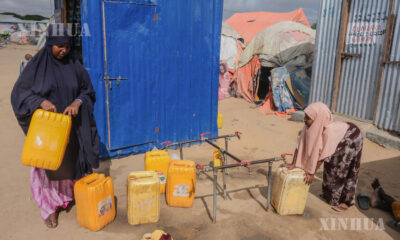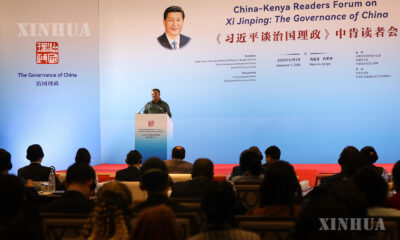Media
ကင်ညာနိုင်ငံတွင် မိုးခေါင်ရေရှားမှုဒဏ် ပြင်းထန်လာခြင်းကြောင့် လူပေါင်း ၄.၃ သန်း စားနပ်ရိက္ခာရှားပါးမှုများနှင့် ရင်ဆိုင်နေရ
နိုင်ရိုဘီ၊ အောက်တိုဘာ ၁၆ ရက် (ဆင်ဟွာ)
ကင်ညာနိုင်ငံတွင် အောက်တိုဘာမှ ဒီဇင်ဘာလအတွင်း မိုးရွာသွန်းချိန်နည်းပါးခြင်းကြောင့် စိုက်ပျိုးလယ်ယာရိတ်သိမ်းမှု မျှော်လင့်ချက်များ ပျက်သုဉ်းခဲ့ရာ လူပေါင်း ၄.၃၅ သန်းမှာ စားနပ်ရိက္ခာရှားပါးမှုများနှင့် ရင်ဆိုင်နေရကြောင်း အမျိုးသား မိုးခေါင်ရေရှားမှုဆိုင်ရာ စီမံခန့်ခွဲရေးဌာန အာဏာပိုင်အဖွဲ့(NDMA) ၏ နိုဝင်ဘာ ၁၄ ရက်က နောက်ဆုံးထုတ်ပြန်လိုက်သည့် အချက်အလက်များတွင် ဖော်ပြထားသည်။
မိုးခေါင်ရေရှားမှုဒဏ်ခံစားနေရသည့်ခရိုင်နှင့် မိုးနည်းသောခရိုင် ၂၀ ကျော်ရှိ အသက် ၆ လမှ ၅၉ လအတွင်းရှိ ကလေးငယ် ၉၄၂,၀၀၀ ဦး နှင့် နို့တိုက်မိခင် ၁၃၄,၀၀၀ ဦးတို့သည် အာဟာရချို့တဲ့မှုနှင့် ဆိုးဝါးစွာ ရင်ဆိုင်နေရပြီး လူသားချင်းစာနာထောက်ထားမှုဆိုင်ရာ အရေးပေါ် အကူအညီများ လိုအပ်နေကြောင်း NDMA အရ သိရသည်။
ကင်ညာနိုင်ငံတွင် ဆယ်စုနှစ် ၄ ခုကြာ ရင်ဆိုင်နေရသည့် ဆိုးဝါးသော စားနပ်ရိက္ခာရှားပါးမှုသည် မိုးရာသီ ၄ ရာသီ ဆက်တိုက် ဆုံးရှုံးမှု၊ ကိုဗစ်-၁၉ ကပ်ရောဂါ၏ အနုတ်လက္ခဏာသက်ရောက်မှု၊ ဈေးနှုန်းမြင့်မားသော လောင်စာဆီနှင့် မြေဩဇာတို့ကြောင့် ဖြစ်ကြောင်း သိရသည်။
အလယ်ပိုင်း၊ အနောက်ပိုင်းနှင့်ချိုင့်ဝှမ်းဒေသများရှိ ပုံမှန်စပါးကျီများပင်လျှင် မိုးရေနည်းပါးခြင်းနှင့် မြေဩဇာဈေးနှုန်းမြင့်မားခြင်းကြောင့် စားနပ်ရိက္ခာရှားပါးမှုအပေါ် သက်ရောက်မှုများ ရှိကြောင်း ကင်ညာသမ္မတ William Ruto က လွန်ခဲ့သောရက်သတ္တပတ်က ပြောကြားခဲ့သည်။
“ကျွန်တော်တို့ အခြေအနေက အလွန်ဆိုးဝါးအန္တရာယ်များတဲ့ အနေအထားမှာရှိပါတယ်။ ခရိုင် ၂၀ က သမားရိုးကျမဟုတ်တဲ့ မိုးခေါင်ရေရှားမှု ASAL ရဲ့ သက်ရောက်မှုဒဏ်ကို ခံနေရတယ်။ ကျွန်တော်တို့မှာ ASAL ဖြစ်ပွားတဲ့နေရာနှင့် နိုင်ငံရဲ့အခြားနေရာတွေက လူပေါင်း ၄.၃ သန်းကျော်က ဒီမိုးခေါင်ရေရှားတဲ့ ဒဏ်ကို ခံစားနေရတယ်။ ကျွန်တော်တို့မှာ ၄ နှစ်ဆက်တိုက် မိုးရေနည်းပါးမှု၊ သီးနှံမဖြစ်ထွန်းမှုတွေနဲ့ ကြုံတွေ့နေရတယ်။ ဒါရဲ့ရလဒ်က ကျွန်တော်တို့တိုင်းပြည်မှာ စားစရာမရှိတဲ့ လူဦးရေးက ဧရာမ များပြားလာတယ်။ ကျွန်တော်တို့မှာ အိမ်မွေးတိရစ္ဆာန်ပေါင်း ၂.၅ သန်းနဲ့ သားရဲတိရစ္ဆာန်အများအပြား ဆုံးရှုံးလိုက်ရတယ်။ ဒါကို ပမာဏနဲ့ပြောရမယ်ဆိုရင် ကန်ဒေါ်လာ ၁.၅ ဘီလီယံခန့် ဆုံးရှုံးမှု ရှိပါတယ်” ဟု ကင်ညာသမ္မတ William Ruto က ပြောကြားခဲ့သည်။
နိုင်ငံ၏ ငတ်မွတ်ခေါင်းပါးမှုနှင့်အာဟာရချို့တဲ့မှုကို လျော့ပါးစေရန် လယ်ယာစိုက်ပျိုးရေးနှင့်ဆည်မြောင်းကဏ္ဍ၊ သီးနှံအမျိုးစားကောင်းမွန်ရေး နှင့် ရာသီဥတုဆိုင်ရာ စမတ် (smart) မွေးမြူရေးစသည့် လုပ်ငန်းများကို အစိုးရက ရင်းနှီးမြှုပ်နှံမှုများ ပြုလုပ်သွားမည်ဟု ၎င်းက ထပ်လောင်းအလေးထား ပြောကြားခဲ့သည်။ (Xinhua)
………………………………
(English Version)
Kenya says 4.3 mln people food insecure as drought intensifies
The number of Kenyans grappling with severe food insecurity stands at 4.35 million, as depressed October-December short rains dash hopes of a bumper harvest in many parts of the country, the National Drought Management Authority (NDMA) said in its latest update released on Monday.
According to the NDMA, 942,000 children aged six to 59 months alongside 134,000 lactating mothers in more than 20 drought-affected arid and semi-arid counties are acutely malnourished and in need of urgent humanitarian assistance.
Kenya is experiencing the most severe food insecurity in the past four decades linked to four consecutive failed rainy seasons coupled with the adverse impacts of the COVID-19 pandemic, and the high cost of fuel and farm inputs like fertilizer.
Kenyan President William Ruto last week said that even the traditional breadbaskets located in central, western, and Rift Valley regions had been affected by food scarcity, citing sparse rainfall and high cost of fertilizer.
SOUNDBITE (English): WILLIAM RUTO, Kenyan President
“We are in a very precarious position, 20 counties are affected even the non-tradition ASAL (arid and semi-arid areas) are also affected. We are all way up to 4.3 million people in ASAL and in other parts of the country affected by this drought. We are facing the fourth consecutive year of rain failure and crop failure. And as a result, we have a huge population of our country who do not have food. We have lost 2.5 million heads of livestock and so much wildlife as well. If you just quantify the livestock, we are talking about 1.5 billion dollars in losses.”
He reiterated the government’s commitment to invest in resilience projects like irrigated farming, adoption of improved crop varieties, and climate-smart pastoralism to help alleviate hunger and malnutrition in the country.
Xinhua News Agency correspondents reporting from Nairobi.
(XHTV)






